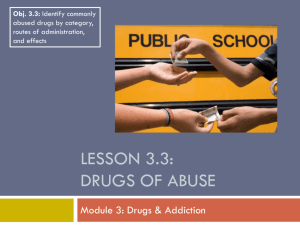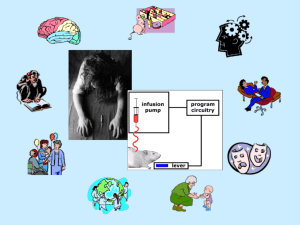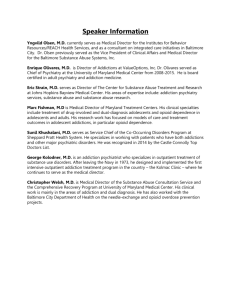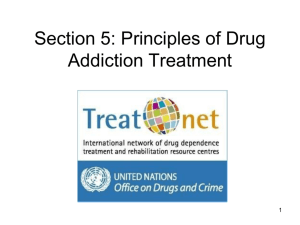SCHOOL OF SOCIAL WORK COURSE NUMBER: SOWO 701-278
advertisement
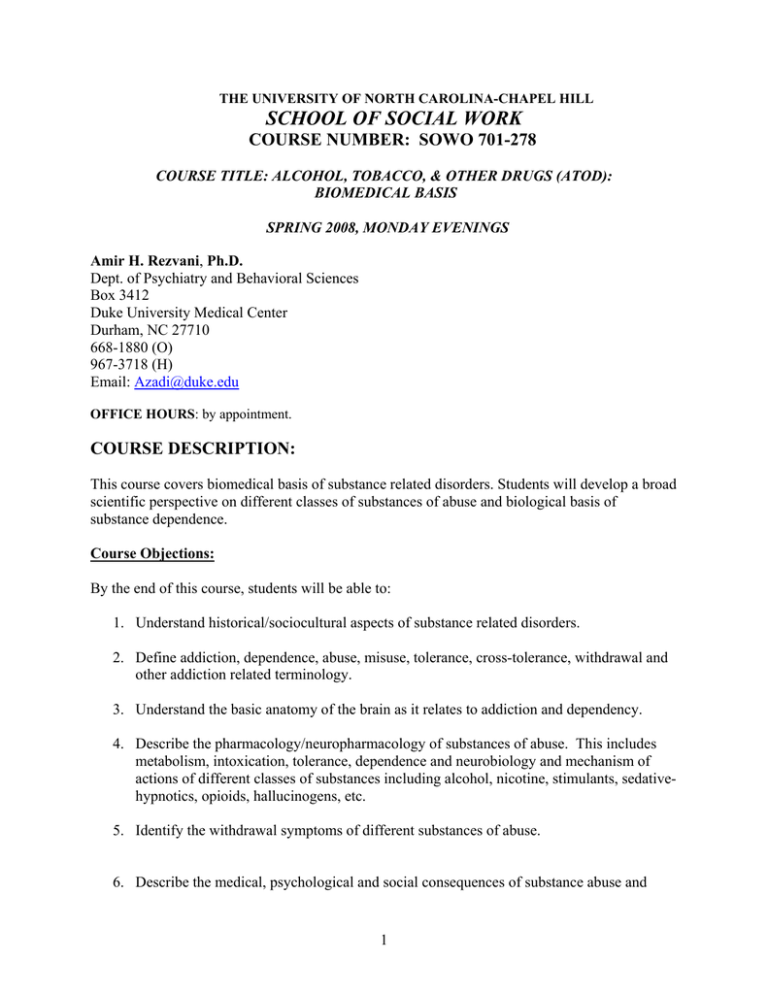
THE UNIVERSITY OF NORTH CAROLINA-CHAPEL HILL SCHOOL OF SOCIAL WORK COURSE NUMBER: SOWO 701-278 COURSE TITLE: ALCOHOL, TOBACCO, & OTHER DRUGS (ATOD): BIOMEDICAL BASIS SPRING 2008, MONDAY EVENINGS Amir H. Rezvani, Ph.D. Dept. of Psychiatry and Behavioral Sciences Box 3412 Duke University Medical Center Durham, NC 27710 668-1880 (O) 967-3718 (H) Email: Azadi@duke.edu OFFICE HOURS: by appointment. COURSE DESCRIPTION: This course covers biomedical basis of substance related disorders. Students will develop a broad scientific perspective on different classes of substances of abuse and biological basis of substance dependence. Course Objections: By the end of this course, students will be able to: 1. Understand historical/sociocultural aspects of substance related disorders. 2. Define addiction, dependence, abuse, misuse, tolerance, cross-tolerance, withdrawal and other addiction related terminology. 3. Understand the basic anatomy of the brain as it relates to addiction and dependency. 4. Describe the pharmacology/neuropharmacology of substances of abuse. This includes metabolism, intoxication, tolerance, dependence and neurobiology and mechanism of actions of different classes of substances including alcohol, nicotine, stimulants, sedativehypnotics, opioids, hallucinogens, etc. 5. Identify the withdrawal symptoms of different substances of abuse. 6. Describe the medical, psychological and social consequences of substance abuse and 1 addiction. This will include different substances of abuse. Effects of different drugs on the brain and other organs will be emphasized. 7. Understand the prevalence and consequences of substance abuse in special populations including women, elderly, and adolescents. Further, students will understand the pattern and epidemiology of substance abuse among Native Americans, African Americans, and health professionals. 8. Describe the existing models of substance abuse and dependence. These will include family, biological, biopsychosocial, and public health models of dependence. 9. Understand the existing pharmacotherapies for the treatment of substance abuse and scientific rationale behind each treatment. New discoveries in treatments will be discussed. EXPANDED DESCRIPTION AND OBJECTIVES: The course is designed as a review of basics as well as an update on new methods and discoveries that bear on the causes and treatment of dependence. Although, the course will focus on recent scientific findings on biomedical basis of dependence and its treatment, it will be packaged for non-science major. Thus, a science major is not required for this course. This course will focus on biomedical basis of substance abuse and drug dependency. We will explore the biological as well as psychosocial aspects of substance related disorders. We will study the distinction between drug abuse, as a social problem, and drug dependency as a brain disease. These will be accomplished by debates, discussions and presentation of recovering drug addicts with different biological/cultural backgrounds. We will enhance our understanding of the problem of dependency and substance abuse by visiting and studying a therapeutic community in Durham. The course will focus on drugs such as alcohol, cocaine, nicotine, opioids, caffeine, marijuana, amphetamines, steroids, inhalants, ecstasy, etc. Further, fetal effects of these drugs and health consequences of substance abuse will be explored throughout the course. Overall, by the end of this course, students will be able to: 1. Establish a broad and scientifically relevant attitude toward dependency to different drugs by understanding the true nature of addiction. 2. Apply a multiple approach to diagnose and assess the problem of substance abuse and dependency. 3. Apply a multiple approach for the treatment of drug dependency. REQUIRED TEXT/READINGS: 2 1. “Buzzed”, C. Kuhn, S. Swartzwelder and W. Wilson. 1998, W.W. Norton & Company, Inc. ISBN 0393317323, 1998. 2. Terry, My Daughter’s Life -and -Death Struggle with Alcoholism. George McGovern, Willard, New York, 1997. 3. Addiction from Biology to Public Policy. Avram Goldstein, Oxford University Press, New York, 2001. 3. Principles of Addiction Medicine, American Society of Addiction Medicine, 1997. (Don’t need to purchase this particular one. Assigned chapters will be put in the library of the School of Social Work) 4. Substance of Abuse: A Comprehensive Textbook, Lowison JH, Ruiz P, Milman RB, Langrod JG (1997). Third edition. Williams & Wilkins, Baltimore. (Don’t need to purchase. Assigned chapters from this book will be put in the library of the School of Social Work). 5. www.med.unc.edu/subabuse TEACHING METHODS: The instructor will lecture on key concepts and contents. Students’ active participation in the debate and discussion is strongly recommended. A field trip to a therapeutic community in Durham (Triangle Residential Options for Substance Abusers, TROSA) has been incorporated into the course. One session of the class has put aside for this purpose. The field trip will last about 3 hours. Students are expected to complete required and independent readings before each session. Students are expected to actively participate in class discussion by introducing relevant case examples and/or questions and expressing opinions. Grade composition and evaluation The evaluation will be determined by several factors: a) Class attendance and active participation in the debates and discussions (attending all sessions =10%, participation in the discussion and debates =10%). b) Presentation (10%): 10-15 min informal presentation on any aspect of addiction relevant to the course. Students need to consult with the instructor about the topic of their presentations. c) A term-paper or a project (30%) (due April 7, 2008), d) Two exams (20% each). Exams will be administered under the University Honor Code and are designed to evaluate knowledge and understanding of the material covered in class and in assigned readings. Study group is highly encouraged for the preparation. The first exam will consist of multiple choice, essays, short answer questions and will cover reading assignments for the first 7 sessions. The second exam will also consist of multiple choice, essays and short answer questions and it will 3 cover the second half of the course. All exams should be submitted with your student ID. GRADING SYSTEM 94 -100 = H 80 – 93 = P 70 – 79 = L 69 and below = F POLICY ON INCOMPLETE AND LATE ASSIGNMENTS Students are expected to turn in all assignments on time. Any exceptions will be graded down 5 points each class session. Incomplete assignments will be discussed with the particular student. POLICY ON ACADEMIC DISHONESTY “Please refer to the APA Style Guide, The SSW Manual, and the SSW Writing Guide for information on attribution of quotes, plagiarism and appropriate use of assistance in preparing assignments. All written assignments should contain a signed pledge from you stating that “I have not given or received unauthorized aid in preparing this written work”. In keeping with the UNC Honor Code, if reason exists to believe that academic dishonesty has occurred, a referral will be made to the Office of the Student Attorney General for investigation and further action as required. Evaluation of Student Performance: The following factors are considered when determining the grade earned by each student. 1. Grade Distribution. Grades will be earned according to the following criteria. An "L" or "F" (depending upon the gravity of deficiency) will be assigned for failing to complete any of the above-mentioned requirements as set forth in the syllabus. Excessive absences or tardiness without justifiable reason, failure to participate in class discussions, and inability to produce papers that meet the criteria set forth in handouts or are of graduate-level skills, e.g., excessive spelling, punctuation, grammatical, and citation errors, will adversely affect a student's grade. Students are expected to use a 12-point font and the reference style of the Publication Manual of the American Psychological Association, 4th edition. A "P" will be awarded for completion of all requirements as set forth in this syllabus and with none of the deficiencies associated with "L" or "F." A "P" as defined by the Graduate School signifies entirely satisfactory work. An "H" is awarded to students who are eligible for a "P" but whose work reflects "clear excellence" as defined by the Graduate School. "Clear excellence" means going beyond "P-level" requirements in two ways: (a) analysis and evaluation of clinical practice, and (b) extensive use of scholarly literature in preparing the term paper and debates. Satisfying both "H-level" options, (a) and (b), will virtually guarantee an "H." 4 PROPOSED CALENDAR AND COURSE OUTLINE Session/date Topics Reading Assignments 1 (1/14) Introduction to the course, Housekeeping, Expectations, Historical and Social Aspects of Epidemiology of Substance-related Disorders Demon Rum (movie) Substance Abuse: A Comprehensive textbook, chapters 1 (SoSw library.) 2 (1/28) Instructor would be out of town. You are required to see a movie or read an article related to any aspects of addiction and write a 1-2 page report. 3 (2/4) Definitions, Addiction Terminology The Disease Concept, Social Issues Introduction to the Brain The Reward Pathway Buzzed, chapter 13 Addiction, chapter 3 4 (2/11) How and Where Psychoactive Drugs Act? Drugs Classification/neuropharmacology Alcohol Abuse and Alcoholism, Neuropharmacology of Alcohol, Genetic aspects, Biological Markers Animal Models of Addiction Buzzed, chapter 14 Addiction, chapters 1-3 Buzzed, chapter 1 Addiction, chapters 7&9 5 (2/18) Fetal Alcohol Effects Models of Abuse, Social Aspects Principles of Addiction Medicine, sec I, chapter 6 (Library) Terry, My Daughter’s Life and -Death Struggle with Alcoholism Discussing Terry’s life 6 (2/25) Nicotine Addiction and Caffeine Interaction of Nicotine and Alcohol Cocaine and other Stimulants Buzzed, chapters 8 & 2 Addiction, chapters 8 &13 Addiction, chapter 11 Buzzed , chapter 12 7 (3/3) Mid-term Exam All materials so far (3/10) Recess- No class 8 (3/17) Field Trip (TROSA) Therapeutic Communities as Alternatives Substance Abuse: A Comprehensive Text Book Chapter 24 (library) 9 (3/24) Opioids, Neurobiology and Clinical Buzzed, chapter 9 5 Aspects, Methadone Maintenance Social Aspects Addiction, chapter 10 10 (4/31) Marijuana, Legalization, Hallucinogens Addiction, chapters 12 & 14 Buzzed, chapter 6 11 (4/7) Anabolic Steroids, Inhalants, Ecstasy Buzzed, chapters 6, 11 Term Paper is Due Today 12 (4/14) Special Populations and Substance Abuse (Elderly, Women, Adolescents, Native Americans) Principal of Addiction Sect. XVIII (library) 13 (4/21) Retreat, Overview of the Course & Students’ Projects/Papers Presentations 14 (4/28) FINAL EXAM & COURSE EVALUATION 6
